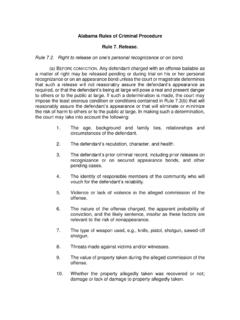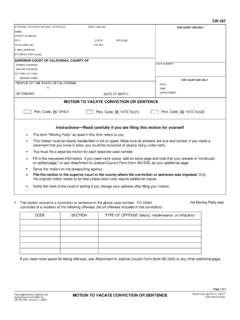Transcription of This opinion is subject to revision before publication
1 This opinion is subject to revision before publication UNITED STATES COURT OF APPEALS FOR THE ARMED FORCES _____ UNITED STATES Appellee v. Jonathan QUEZADA, Lance Corporal United States Marine Corps, Appellant No. 21-0089 Crim. App. No. 201900115 Argue October 20, 2021 Decided December 20, 2021 Military Judges: Matthew J. Kent (motions) and John L. Ferriter (arraignment, motions, and trial) For Appellant: Lieutenant Daniel O. Moore, JAGC, USN (argued). For Appellee: Lieutenant Jennifer Joseph, JAGC, USN (argued); Lieutenant Colonel Christopher G. Blosser, USMC, Major Kerry E. Friedewald, USMC, and Brian K. Keller, Esq. (on brief); Lieutenant Colonel Nicholas L. Gannon, USMC, and Lieutenant Gregory A. Rustico, JAGC, USN. Judge MAGGS delivered the opinion of the Court, in which Chief Judge OHLSON, Judge SPARKS and Judge HARDY, and Senior Judge EFFRON, joined. _____Judge MAGGS delivered the opinion of the Court. Military judges must give the members appropriate instructions before they deliberate on findings.
2 Rule for Courts-Martial ( ) 920(a). The standard false exculpatory statements instruction informs the members that if the accused makes a statement tending to establish his or her innocence , and the statement is later shown to be false, the members may consider whether this circumstantial evidence points to consciousness of guilt. Dep t of the Army, Pam. 27-9, Legal Services, Military Judges Benchbook, ch. 7, para. 7-22 (2020). This Court previously has stated that the false exculpatory statements instruction announces a correct principle of law. United States v. Colcol, 16 479, 484 ( 1983); see also Wilson v. United States, 162 613, 620 21 (1896) (upholding a similar instruction). But in this United States v. Quezada, No. 21-0089/MC opinion of the Court 2 case, Appellant asserts that the instruction violated his presumption of innocence because he was charged both with committing a substantive offense and with making a false official statement relating to that offense.
3 Upon careful consideration of Appellant s arguments, however, we find no error. We therefore affirm the decision of the United States Navy-Marine Corps Court of Criminal Appeals (NMCCA). United States v. Quezada, No. NMCCA 201900115, 2020 CCA LEXIS 378, 2020 WL 6268490 (N-M. Ct. Crim. App. Oct. 26, 2020) (unpublished). I. Background , a seventeen-year-old civilian, accused Appellant of providing her with whiskey and, without her consent, licking her vagina and anus and touching other parts of her body. During a subsequent investigation into the incident, Appellant told agents of the Naval Criminal Investigative Service (NCIS) that he did not lick or touch s vagina, or used words to that effect. Appellant also made exculpatory statements to his wife, to a 911 operator, and to a military policeman desk sergeant. Laboratory analysis of swabs of s vagina, anus, and ear later identified DNA evidence that strongly confirmed s accusations against Appellant.
4 Appellant was charged with one specification of violating a lawful general order by providing alcohol to a minor, one specification of making a false official statement by telling the NCIS agents that he did not touch or lick s vagina, one specification of sexual assault by bodily harm by penetrating s vulva with his tongue, and one specification of abusive sexual contact by bodily harm by touching s ear, anus, and other named body parts with his tongue, in violation of Articles 92, 107, and 120 of the Uniform Code of Military Justice (UCMJ), 10 892, 907, 920 (2012 & Supp. IV 2013 2017). Appellant pleaded not guilty to all charges and specifications. A general court-martial with members tried Appellant. before the members deliberated on findings, the military judge informed counsel of his intention to provide a false exculpatory statements instruction. Trial defense counsel offered a brief response: We object to the false exculpatory United States v.
5 Quezada, No. 21-0089/MC opinion of the Court 3 [statements instruction] because of the potential confusion with the Article 107, false official [statement charge and specification]. Trial defense counsel did not set forth on the record a request for tailoring of the instruction, nor did trial defense counsel request on the record any other modification of the instruction. The military judge, however, determined that the requested instruction was reasonably raised by the evidence, and rejected trial defense counsel s objection. The military judge then instructed the members as follows: There has been evidence that after the offenses were allegedly committed, the accused may have made a false statement or given a false explanation about the alleged offenses. Conduct of an accused, including statements made and acts done, upon being informed that a crime may have been committed, or upon being confronted with a criminal charge, may be considered by you in light of other evidence in the case in determining the guilt or innocence of the accused.
6 If an accused voluntarily offers an explanation or make[s] some statement tending to establish his innocence , and such explanation or statement is later shown to be false, you may consider whether the circumstantial evidence points to a consciousness of guilt. You may infer that an innocent person does not ordinarily find it necessary to invent or fabricate a voluntary explanation or statement tending to establish his innocence .. [T]his inference is not required. Whether the statement that was made was voluntary or was false is for you to decide. You may also properly consider the circumstance under which the statements were given, such as whether they were given under oath and the environment under which they were given. Whether .. evidence as to an accused s voluntary explanation or statements points to a consciousness of guilt, and the significance, if any, to be attached to any such evidence are matters for determination by you, Court members.
7 The military judge repeatedly instructed the members that the Government had the burden of proving each element of each offense beyond a reasonable doubt. At no time did the United States v. Quezada, No. 21-0089/MC opinion of the Court 4 military judge discuss any lower standard of proof. The military judge also instructed the members as follows: An accused may be convicted, based only on evidence before the Court, not on evidence of a general criminal disposition. Each offense must stand on its own, and you must keep the evidence of each offense separate. Stated differently, if you believe or find that the accused is guilty of one offense, you may not use that finding or belief as a basis for inferring, assuming, or proving that he committed any other offense. If evidence has been presented which is relevant to more than one offense, you may consider that evidence with respect to each offense to which it is relevant.
8 In arguments on findings, trial counsel focused mostly on testimony by about what happened and on the DNA evidence that implicated Appellant. Appellant s civilian defense counsel identified reasons for doubting s credibility and pointed to evidence that may have consented to the sexual conduct with Appellant. The court-martial found Appellant guilty of all the charges and specifications and sentenced him to six years of confinement and a dishonorable discharge. The convening authority approved the sentence as adjudged. On appeal to the NMCCA, Appellant renewed his objection to the false exculpatory statements instruction. The NMCCA, however, concluded that the military judge had acted properly in providing the instruction. Quezada, 2020 CCA LEXIS 378, at *7 12, 2020 WL 6268490, at *3 4. In reaching this conclusion, the NMCCA recognized that the false exculpatory statements instruction is not appropriate for general denials of criminal wrongdoing.
9 Id. at *9, 2020 WL 6268490, at *3. As this Court explained in Colcol, in order to decide that an accused s general denial of illegal activity is false, the factfinder must decide the very issue of guilt or innocence ; and so the instruction would only tend to produce confusion because of its circularity. 16 at 484. But the NMCCA found this restriction on using the false exculpatory statements instruction inapplicable in this case, reasoning: Appellant did not make a general denial of criminal wrongdoing to NCIS; rather, he denied specific United States v. Quezada, No. 21-0089/MC opinion of the Court 5 conduct. He specifically denied that he licked [ s] vagina. However, the act of licking [ s] vagina would only satisfy one element of what became Specification 1 of Charge III, sexual assault. Appellant s statement does not resolve the question of whether [ ] provided her consent to engage in that act, also a key element of the Article 120 offense alleged in Specification 1 of Charge III.
10 Quezada, 2020 CCA LEXIS 378, at *10, 2020 WL 6268490, at *4. The NMCCA also cited United States v. Opalka, 36 938, 944 ( 1966), a decision that this Court also had cited in Colcol, 16 at 484. Quezada, 2020 CCA LEXIS 378, at *9 , 2020 WL 6268490, at *3 In Opalka, the Air Force Board of Review indicated that a false exculpatory statements instruction should not relate the instruction to any specific utterance of the accused because doing so might emphasize the prosecution s case to the detriment of the accused by indicating a belief that the particular statement or explanation might be false. 36 at 944 45. Relevant to this point, the NMCCA made the following observation: [T]he military judge s instruction did not identify any particular statement the members could consider to be a false explanation. There were multiple false exculpatory statements that came out in the course of the trial. Appellant also gave false explanations to his wife, to the emergency operator and to the Desk Sergeant.










